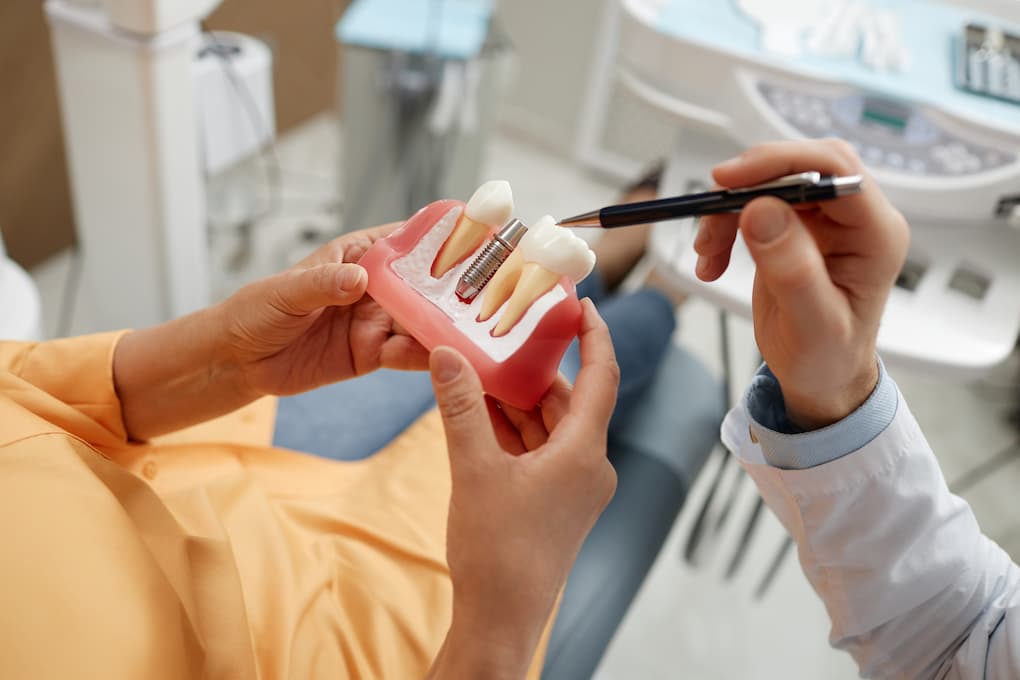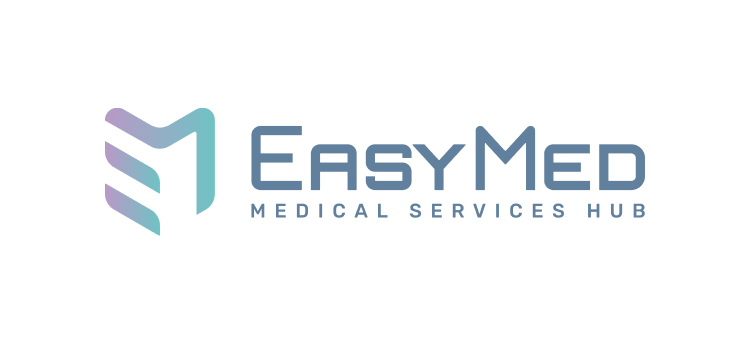
Dental implantation
Dental implants are an advanced procedure in dentistry that provides a solution to restore missing teeth. Implants are titanium screws that are implanted into the jawbone and serve as support for dental crowns, bridges, or removable dentures. The procedure not only restores the teeth' functionality but also contributes to the preservation of bone health, preventing its atrophy after tooth loss.
Дополнительные процедуры:
- Лабораторный анализ мочи
- Элемент списка #2
- Элемент списка #3
Implantation with EasyMed
Indications for implantation
- Loss of one or more teeth: The main indication for implantation is the absence of one or more teeth. The implants serve as a replacement for the roots of the teeth, providing the basis for the placement of dental crowns, bridges, or dentures.
- Intolerance to removable dentures: For patients experiencing discomfort or difficulty wearing removable dentures, implantation can be an effective alternative, providing a more stable and comfortable solution.
- Damaged or unsuitable teeth for restoration: Implants may be recommended as part of a comprehensive recovery plan when teeth are severely damaged and beyond repair with traditional treatments.
- Prevention of bone atrophy: After tooth loss, bone tissue gradually atrophy. Implantation helps stimulate and maintain bone tissue, preventing bone shrinkage and degradation.
- Improved chewing function and speech: Implants restore the smile's aesthetics and the dentition's functionality, improving chewing and restoring speech clarity.
- Improved quality of life: Implantation significantly improves patients' overall quality of life by restoring the aesthetic appearance of the smile, self-confidence, and comfort when eating and socializing.
Preparation for implantation
- Preliminary consultation: A meeting with an implantologist is necessary to assess the condition of the oral cavity, determine the need for implantation, and discuss a treatment plan.
- X-ray or CT scan of the jaw: Diagnostic images are necessary to assess the volume and quality of the bone tissue, as well as to accurately plan the placement of the implant.
- Professional teeth cleaning: To minimize the risk of infection, it is recommended to perform a deep cleaning of the teeth and gums before placing implants.
- Complete Oral Hygiene: Keeping your mouth clean is important to prevent infections after implant placement.
- Abstinence from smoking and alcohol: Smoking and alcohol consumption can negatively affect the healing process and the integration of the implant with the bone tissue, so it is recommended to avoid them for a few weeks before and after the procedure.
- Discussion of pain management: Implants are usually placed under local anesthesia, but other types of anesthesia can be discussed if necessary.
Important! When making an appointment for an implant procedure in our company, the manager will inform you about all aspects of preparation. You will receive full information on the necessary pre-actions and care tips after the implants are placed to ensure the best results and comfort during the treatment.
How is the procedure performed
A visit to the dental implant clinic begins with paperwork at the appointment, after which the patient meets with a specialist for a detailed consultation and planning of the procedure. This stage takes about 15-30 minutes and involves discussing the treatment plan and potential risks.
This is followed by a preparation phase that includes X-rays or a CT scan of the jaw to pinpoint the implant’s location. Preparation can take a few minutes to an hour, depending on the situation’s complexity and the need for additional diagnostics.
The implantation process begins with local anesthesia, after which the doctor performs a surgical procedure to insert the implant into the jaw bone. Depending on the number of implants to be placed and the complexity of the case, the duration of the surgery can vary from 30 minutes to several hours.
After the implant is placed, the patient may need a recovery period that lasts from a few days to several months, during which osseointegration (fusion of the implant with the bone) occurs. At the final stage of the procedure, a dental crown is placed on the implant, which may require additional visits to the doctor.
Thus, the total duration of the dental implant process from start to finish can vary from a few hours to several months, including the recovery period. Patients are provided with detailed information about each procedure stage to plan their time and prepare for the implantation process and subsequent recovery.
Contraindications to the procedure
- Insufficient bone volume: Sufficient bone volume and quality are required for successful implant retention.
- Acute infectious diseases: For example, viral, bacterial, or fungal infections that can affect the healing process.
- Severe systemic diseases, Such as diabetes in the stage of decompensation, oncological diseases, and serious disorders in the cardiovascular system.
- Immunodeficiency conditions, Including HIV/AIDS or immunodeficiency caused by taking immunosuppressive drugs.
- Bisphosphonate treatment: Especially intravenous, which increases the risk of jawbone osteonecrosis.
- Poor control of habits that are harmful to health, Like smoking and alcoholism, which negatively affect healing and long-term implantation success.
- Pregnancy: Dental surgery is generally not recommended for women during pregnancy.
Important! When making an appointment for a dental implant procedure, the EasyMed manager will clarify the client’s medical history and discuss all potential contraindications. This will allow for an individual approach to treatment planning and ensure the safety and effectiveness of the procedure.
Safety of the procedure
Dental implantation is one of the most effective long-term methods for restoring lost teeth. If all medical recommendations and suitable conditions for implantation are followed, the procedure is safe.
Implantation is usually performed once to replace a lost tooth, and with proper care and maintenance of oral health, the implant can last a lifetime.
Modern techniques and materials significantly reduce the risks associated with implantation. However, like any surgical procedure, implantation has potential hazards, such as infection at the implant site, inflammation, damage to nerves or vessels, and the possibility of implant rejection by the body.
To minimize the risks, a thorough preoperative diagnosis, including X-rays or CT scans, is important to assess the condition of the bone tissue and properly plan the placement of the implant. Post-operative care and regular dentist visits to monitor the implant’s condition and surrounding tissues are also critical.
Advantages of contacting EasyMed:
- EasyMed speeds up scheduling an implant procedure, making it easier for patients to access qualified specialists and reducing waiting times.
- Cooperation only with trusted clinics with a good reputation and experience in implantology guarantees high-quality treatment.
- EasyMed considers each patient's personal and medical characteristics when choosing a clinic and specialist for dental implants.
- Providing complete information about the implantation process, including preparation for the procedure, its stages, and follow-up care.
- EasyMed accompanies clients at all stages, from the beginning to the end of the implantation process, providing support and assistance in solving any issues.
Want to make an appointment for a review?
Fill in the following details
and we will contact you as soon as possible
Faq
Frequently asked Questions
We provide personalized healthcare services. Our main goal is to provide you with a quick appointment for the necessary medical examination or consultation with a doctor.
There is no need to wait several months: with us you will get to the right specialist in the shortest possible time.
Waiting times depend on the complexity of the procedure and the doctor’s profile. We can make an appointment with some specialists within 24 hours. For complex procedures, the waiting period of which reaches several months, you will be treated with us within 2-3 weeks.
There are a number of procedures (for example, complex types of MRI) that the patient can wait about a year and a half. We can reduce this period to 3 months.
We cooperate with leading specialists in various fields, as well as with top clinics and laboratories throughout Israel and abroad.
Our doctors use the latest treatment protocols and the most advanced technologies. The clinics we work with are equipped with modern equipment that provides the most accurate results.
Our partners are experienced professionals who have earned trust due to their experience, knowledge and professionalism.
We operate in all regions of Israel. Your appointment will be scheduled at the location most convenient for you.
The cost of services depends on the complexity of the procedure and the doctor’s profile. For accurate information and cost calculation, leave your details or call: 033083020
Yes, absolutely. Confidentiality and protection of our clients' personal information is one of our key priorities. We strictly adhere to all legal and ethical standards to ensure the maximum security of your data.
Our specialists will check whether in a particular case a refund from the insurance company is due. If yes, then after completing the procedure, a receipt will be sent to the insurance agent, who, in turn, makes a request to the insurance company to return the amount due to the patient for the procedure completed.



